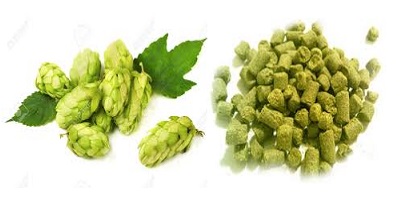
About Hops for Home Beer Making
Hops are used for four (4) main reasons in brewing: BITTERING: FLAVORING: AROMA: PRESERVING: As you might have deduced, you CAN NOT achieve all three sensory characteristics by one addition of hops to the wort. However, with the addition of hops at the proper times in the boiling process, one can achieve all three sensory characteristics even from the same hop variety. Lower alpha rated hop varieties do not function well as bittering agents, while higher alpha rated hops may not make good finishing or aromatic hops. PELLETIZED HOPS We stock pelletized hops from two of the world's largest growers and suppliers, John I Haas, Inc. and Hop Union. We receive hop pellets in small, nitrogen purged, vacuum packed, aluminum foil bags which insure that you receive the freshest hops possible. These hops are ideal for imparting bitterness and flavor. The lupulin glands have been decimated, to a large extent, during the pelletization process which expose the oils to the wort maximizing their effectiveness as aromatic hops. Pelletized hops are preferred by every microbrewery / brewpub with which I’m familiar. WHOLE LEAF PLUG HOPS We are pleased to stock a wide variety of whole leaf hops from the Oregon Hop Company in vacuum packed, oxygen-barrier bags. These prevent oxidation and/or loss of the alpha acid content. These fresh whole leaf hops are best for developing good aromatics in a beer. In order to maintain their freshness, freeze them upon receipt. They should appear green and smell fresh, with a tacky feel.. Oxidation will cause a fading of the color and the leaves will eventually turn brown, but you will never have that experience with our company. The lupulin glands will be bright yellow when fresh, turning orange with slight oxidation. Storage of Hops
The bitterness of the hop balances with the sweetness of the malt. Bitterness is achieved by boiling the hops in the wort at least 30 minutes but preferably for 45 to 60.
Inducing the flavor of the hops into the beer is achieved by boiling the hops in the wort for 10 to 15 minutes.
The aroma of the hops is absorbed into the beer by boiling the hops with the wort for 5 minutes or less, or by “dry hopping”, which is the practice of adding the hops to the secondary fermenter for 4 to 7 days.
Hops are a natural preservative needed to insure a beer’s aging ability.





